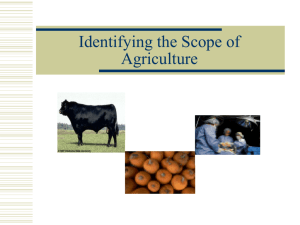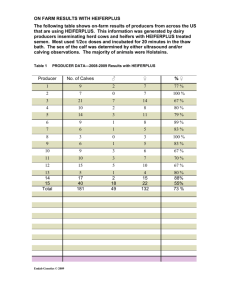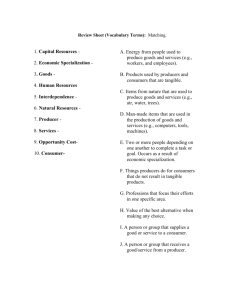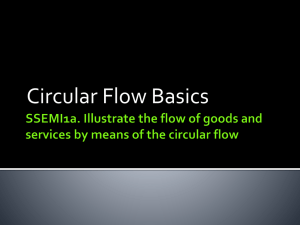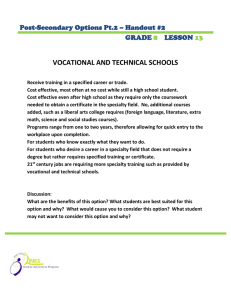Regulatory Environment Affecting California Specialty Crop Producers Panel Discussion
advertisement
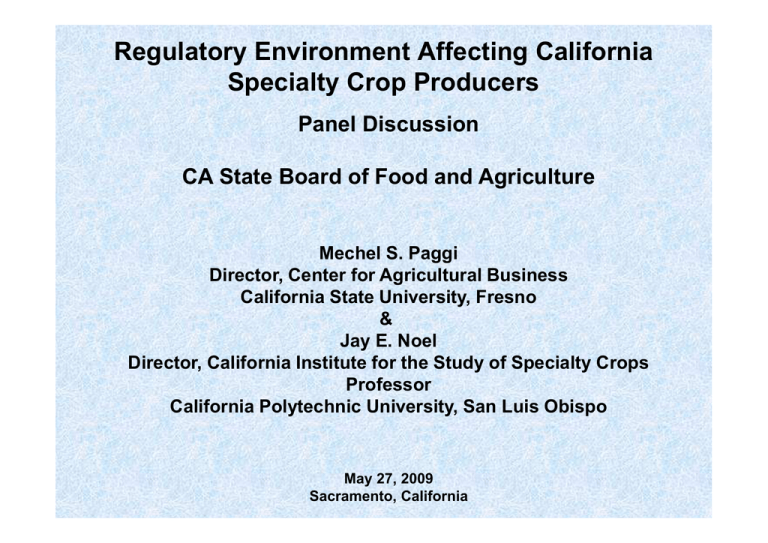
Regulatory Environment Affecting California Specialty Crop Producers Panel Discussion CA State Board of Food and Agriculture Mechel S. Paggi Director, Center for Agricultural Business California State University, Fresno & Jay E. Noel Director, California Institute for the Study of Specialty Crops Professor California Polytechnic University, San Luis Obispo May 27, 2009 Sacramento, California Regulatory Mandates • Water Quality Related Restrictions on incorporation of Processing waste as soil amendments • Air Quality Regulatory Mandates banning burning of Orchard Pruning’s • Air Quality Regulatory Mandates requiring replacement of diesel engines, cotton gin pm2 emissions. • Air Quality Regulatory Mandates on pesticide emissions of VOC • Health Care for Farm Workers Good Agricultural Practices The Heart of Producer Based Food Safety Programs Many Programs ! Which Direction to Pursue? Public GAPs USA = Food Safety Guidelines with emphasis on decreasing risk of microbial contamination Private GlobalGAP = International Standards, can be more robust Private Industry, NGO, etc, etc, etc = Standards Proliferation California State and County Government Agencies With Regulatory Initiatives Affecting Agricultural Producers Hurley, et. al., 2005 Structural Diagram California Environmental Protection Agency Hurley, et. al., 2005 Federal Government Agencies With Regulatory Initiatives Affecting Agricultural Producers Hurley, et. al., 2005 Hurley, et. al., 2005 Cross State Comparison Hamilton, 2006 Visalia Grower – 1,400 acres mixed Citrus EX Reg Cultural Costs $1,762 (+12.8%) Hamilton, 2006 Texas Valley Grower – 5,400 acres Orange/Grapefruit EX Reg Cultural Costs $963 (+3.3%) Hamilton, 2006 Grower Panel Data UC-Extension Budget Process Representative Farm Model Analysis 2009 -20011 Multi-State Regulatory Study Compare and contrast the regulatory rules that affect California agricultural businesses with other states that have similar specialty crop production. Develop case study comparisons of regulatory compliance costs for producers of California specialty crops (5) against similar specialty crops in the other selected states to determine if significant costs difference exists. Utilize representative farm modeling approached, producer panel data to amend UC-Cost and Returns studies and tabulate cumulative additional costs associated with activities identified as necessary to comply with regulatory rules and procedures. Partnering with colleagues in other states to develop equivalent producer input. Funding source: ARI System, Board Initiative (CSUF & Cal Poly, SLO) -No Analysis beyond producer level -No Livestock, Dairy, Poultry -No Analysis of benefits Side At the end of the day, how are these firms going to make significant investments in food safety, traceability, sustainability and other important industry initiatives if the regulatory burden on the business squeezes the profitability to the breaking point? How are they going to survive at all? But what is the cumulative weight of that burden?
